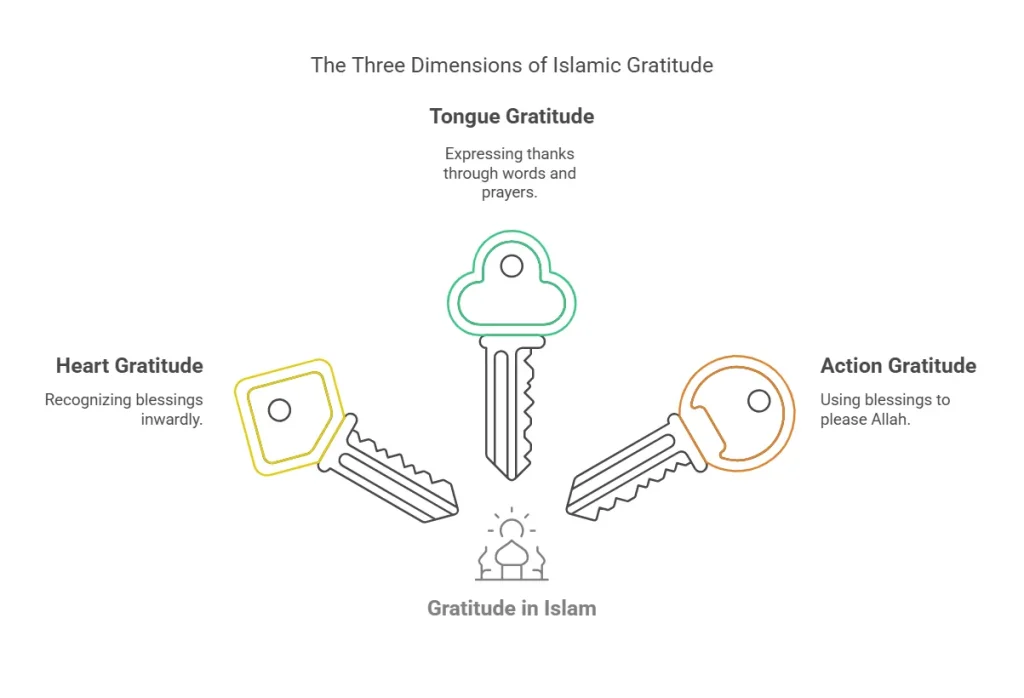Gratitude in Islam, or Shukr, is a backbone of the religion with huge blessings and satisfaction in life. The Quran and Hadith confirm that more prosperity will be achieved to both these directions of life, namely spiritual and worldly issues, if the Allah’s blessings are acknowledged.
The question now is, how does gratitude really affect our lives? Let’s know its significance and benefits.
What is Gratitude (Shukr) in Islam?
Shukr is recognizing and appreciating all the favors of Allah (سبحانه وتعالى) sincerely. Islam teaches three levels of gratitude:

- Gratitude of the Heart – Recognizing blessings inwardly.
- Gratitude of the Tongue – Expressing thanks through words and prayers.
- Gratitude of Actions – Using blessings in ways that please Allah (سبحانه وتعالى).
A believer who practices all three of aspects of gratitude truly completed Shukr in Islam.
The Importance of Gratitude in the Quran
The Quran repeatedly mentions the rewards of the gratitude and also warns about the consequences of ingratitude (Kufr an-Ni’mah – denial of blessings).
Allah (سبحانه وتعالى) says:
“If you are grateful, I will surely increase you [in favor]; but if you deny, indeed, My punishment is severe.” (Surah Ibrahim 14:7)
This verse highlights that gratitude is directly linked to increased blessings from Allah (سبحانه وتعالى). On the other hand, ingratitude results in spiritual and worldly deprivation.
Another Quran verse states:
“So remember Me; I will remember you. And be grateful to Me and do not deny Me.” (Surah Al-Baqarah 2:152)
Hadith on Gratitude: Teachings from Prophet Muhammad (ﷺ)
The Prophet Muhammad (ﷺ) was the best example of gratitude. Despite facing immense trials, he remained thankful in all difficult situations.
One of his famous Hadiths on gratitude states:
“The best of people are those who are most beneficial to others.” (Sunan Al-Mu’jam Al-Awsat 6192)
Another Hadith reminds us that gratitude to people is part of gratitude to Allah سبحانه وتعالى:
“He who does not thank people has not thanked Allah.” (Sunan Abu Dawood 4811)
This means expressing gratitude to others is an essential part of faith.
Benefits of Practicing Gratitude
1. Spiritual Development
- Strengthens faith and trust in Allah.
- Increases alms and rizq .
- Instills patience and humbleness.
2. Mental and Emotional Health
- Decreases worries and stress.
- Fosters positivity.
- Increases more peace and happiness.
3. Building Bonds
- Increases family members love and respect.
- Builds a positive community atmosphere.
- Instills humanity and munificence.
Practical Ways to Cultivate Gratitude
1. Daily Reflection
Spend a few moments every day thinking about the blessings Allah has given you.
2. Make Dua for Gratitude
The Prophet (PBUH) taught this beautiful dua:
اللّهُمَّ أَعِنِّي عَلى ذِكْرِكَ وَشُكْرِكَ وَحُسْنِ عِبادَتِكَ
Allahumma a’inni ‘ala dhikrika wa shukrika wa husni ‘ibadatika.
“O Allah, help me remember You, to be grateful to You, and to worship You in an excellent manner.” (Sunan Abu Dawood 1522)
3. Express Gratitude to Others
A simple “JazakAllahu Khair” (May Allah reward you with goodness) can strengthen relationships.
4. Engage in Acts of Charity
Use your wealth, health, and knowledge to benefit others as a way of showing gratitude to Allah.
Conclusion
Through Shukr, gratitude in Islam becomes a very powerful tool for better spiritual growth, emotional well-being, and strengthening relationships. When performing it, we not only please Allah but experience happiness and success in life. Let’s put it into daily practice and see our blessings multiply, In Sha Allah.


